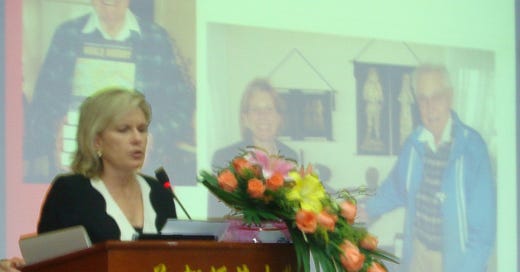Today is a US holiday Monday. Here in Massachusetts, it is Indigenous Peoples Day, but the federal holiday is still called Columbus Day. No matter the name, it always makes me think about Columbus, the ostensible discoverer of the Americas. Two men in my life were connected by Columbus, one as a member of the 1992 Christopher Columbus Quincentenary Jubilee Commission and the other as the author of a highly critical, ecological take on the Columbian legacy.
The former was William H. McNeill, world historian and author of The Rise of the West and Plagues and Peoples. The other was Kirkpatrick Sale, author of Conquest of Paradise. Brown University hosted a debate between them, and Bill McNeill wrote an account of it in his autobiography, The Pursuit of Truth, describing the angry Sale’s book as “the most scholarly, eloquent, and wrong-headed attack on Columbus that the quincentenary had provoked.”
In 2012, twenty years after the event, Bill discovered that I had heard about debate from his opponent. I hadn’t told Bill about my connection with Sale, having been uncertain about how he would take the news. He was, however, excited by it and asked me to find the correspondence so he could use it in the account of my life he had decided to write. The point Bill made in that text is worth considering on this Indigenous Peoples Day.
[Sale] was the son of a professor at Cornell with a wife and two grown-up daughters, and was in England to promote a book he had just published entitled The Conquest of Paradise: Christopher Columbus and the Columbian Legacy (NY: Plume, 1990). Their love was passionate from the start, and when he returned to the United States he persuaded Karen to follow him, where she rented a summer cottage in upstate New York for herself and her children, safely insulated from his wife who worked as an editor in the city. While he travelled to promote his book, he saw Karen from time to time, and conducted a heated correspondence with her.
This was when my name first came to Karen’s attention, for I had reviewed The Conquest of Paradise rather unfavorably in the New York Times. My criticism rankled, and letters Sale wrote to Karen between the 1st and 16th of June, 1992 expressed his disdain for an “irredeemably conventional and square” professor who had agreed to debate with him at the John Carter Brown Library in Providence, Rhode Island. “I gave it to him pretty hard,” he wrote. “Then McNeill got up to rant against Indian societies as shiftless and improvident. (He said not a word about CC, knowing that he was out-classed there), which happily did not sit well with the crowd, and I had a little rebuttal pointing out that he was after all vice-Chair of the official US Quint Commission.” (Letter to Karen, 5 June 1992)
He prevailed because I bumbled in refuting him. My book, Plagues and Peoples (New York, 1976) had taught me that vulnerability to infectious diseases coming from Europe accounted for the destruction of the Amerindian populations that Sale blamed on the discoveries of Columbus. My hope, when joining the Commission, was that we could make clear to the American public that the huge die-off was a wholly unexpected phenomenon that surprised, embarrassed, and impoverished the Spaniards, and did not result from their cruelty and violence, however real that was.
I should have argued that America was not a paradise but a place, like any other, where local inhabitants killed one another wholesale, while Columbus was a man of his times, who killed only a few Indians, thus making it unhistorical and unjust to condemn him by our standards and for things he did not do. But I was full of my own ideas, so talked instead of the biological processes that are beneath human consciousness and therefore unrecorded. I had no written evidence to quote, so the audience accepted what Sale told them, and preferred to think that exposure to new infectious diseases had nothing much to do with what happened. It was an error I still regret, and it permitted Kirkpatrick Sale to rejoice in his victory.
Read the rest. His obituary in the New York Times is here. I recorded his last speech, “Leaving Western Civ Behind.” It was later published in Liberal Education. It should be clear that he was no defender of colonialism and alert to human impact on the environment far earlier than most historians.
Bill McNeill’s Plagues and Peoples is familiar to medical practitioners as well as to historians, and his The Rise of the West won the National Book Prize. I especially relish his book on dance and drill, Moving Together in Time, because one of our shared interests was community. (If only he were still alive to discuss third places with!) Today I am planning to revisit The Pursuit of Power, a topic that seems to be on all our minds. Bill was feted in China recently, as you may remember. I’m missing him today.
Our longest march (with photos from the Shanghai launch)
“Next time we come to China,” said my 15-year-old son Tom as we walked through a market on a spring afternoon in 2001.






